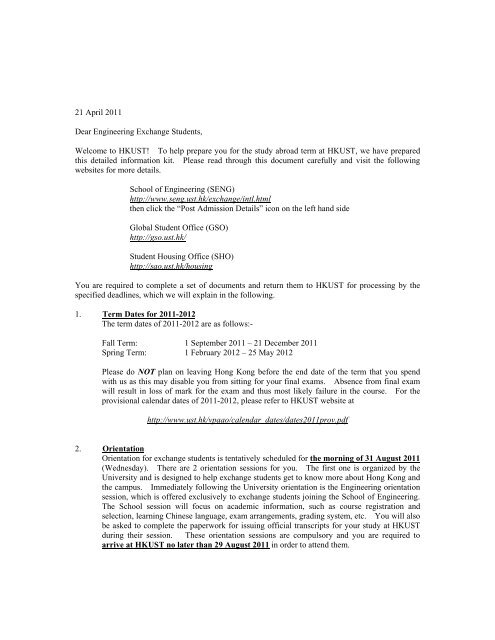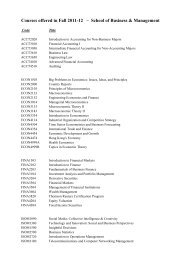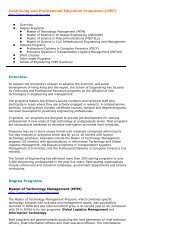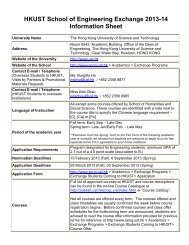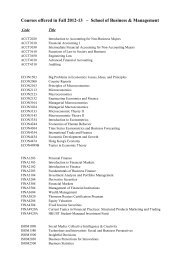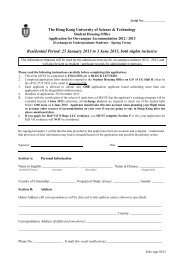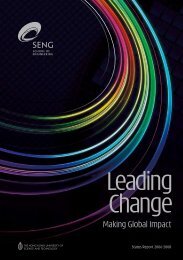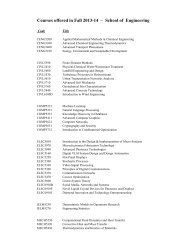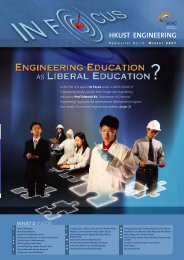21 April 2011 Dear Engineering Exchange Students ... - seng, hkust
21 April 2011 Dear Engineering Exchange Students ... - seng, hkust
21 April 2011 Dear Engineering Exchange Students ... - seng, hkust
You also want an ePaper? Increase the reach of your titles
YUMPU automatically turns print PDFs into web optimized ePapers that Google loves.
<strong>21</strong> <strong>April</strong> <strong>2011</strong><br />
<strong>Dear</strong> <strong>Engineering</strong> <strong>Exchange</strong> <strong>Students</strong>,<br />
Welcome to HKUST! To help prepare you for the study abroad term at HKUST, we have prepared<br />
this detailed information kit. Please read through this document carefully and visit the following<br />
websites for more details.<br />
School of <strong>Engineering</strong> (SENG)<br />
http://www.<strong>seng</strong>.ust.hk/exchange/intl.html<br />
then click the “Post Admission Details” icon on the left hand side<br />
Global Student Office (GSO)<br />
http://gso.ust.hk/<br />
Student Housing Office (SHO)<br />
http://sao.ust.hk/housing<br />
You are required to complete a set of documents and return them to HKUST for processing by the<br />
specified deadlines, which we will explain in the following.<br />
1. Term Dates for <strong>2011</strong>-2012<br />
The term dates of <strong>2011</strong>-2012 are as follows:-<br />
Fall Term: 1 September <strong>2011</strong> – <strong>21</strong> December <strong>2011</strong><br />
Spring Term: 1 February 2012 – 25 May 2012<br />
Please do NOT plan on leaving Hong Kong before the end date of the term that you spend<br />
with us as this may disable you from sitting for your final exams. Absence from final exam<br />
will result in loss of mark for the exam and thus most likely failure in the course. For the<br />
provisional calendar dates of <strong>2011</strong>-2012, please refer to HKUST website at<br />
http://www.ust.hk/vpaao/calendar_dates/dates<strong>2011</strong>prov.pdf<br />
2. Orientation<br />
Orientation for exchange students is tentatively scheduled for the morning of 31 August <strong>2011</strong><br />
(Wednesday). There are 2 orientation sessions for you. The first one is organized by the<br />
University and is designed to help exchange students get to know more about Hong Kong and<br />
the campus. Immediately following the University orientation is the <strong>Engineering</strong> orientation<br />
session, which is offered exclusively to exchange students joining the School of <strong>Engineering</strong>.<br />
The School session will focus on academic information, such as course registration and<br />
selection, learning Chinese language, exam arrangements, grading system, etc. You will also<br />
be asked to complete the paperwork for issuing official transcripts for your study at HKUST<br />
during their session. These orientation sessions are compulsory and you are required to<br />
arrive at HKUST no later than 29 August <strong>2011</strong> in order to attend them.
3. Course Registration<br />
3.1 Course registration period for Fall <strong>2011</strong>-2012 is scheduled in August <strong>2011</strong>. Exact<br />
dates and further details will be announced to students via e-mail in July <strong>2011</strong>. Please<br />
watch out for e-mails from SENG around that time. If there is any change in your<br />
e-mail address (i.e. different from the one that you put down on your application form<br />
for admission), please let me know by email at egstella@ust.hk as soon as possible.<br />
Otherwise, you may lose track of the information and fail to register your desired<br />
courses.<br />
3.2 For administrative convenience and as necessitated by on-campus housing allocation,<br />
our School categorizes all engineering exchange students as “undergraduates” (UG),<br />
including those of you who are pursuing a master’s degree at your home university.<br />
3.3 Course registration is done by students on their own via internet. <strong>Students</strong> must have<br />
internet access in order to register for courses. You will receive email regarding the<br />
procedures to activate your own account for accessing the course registration system in<br />
July <strong>2011</strong>. Please write to me at egstella@ust.hk if you do not receive the<br />
information by 31 July <strong>2011</strong>.<br />
4. Course Selection<br />
When devising your study plan at HKUST, please pay attention to the following points.<br />
4.1 The Academic Calendar is the official publication by HKUST listing all its approved<br />
courses. The <strong>2011</strong>-12 Course Catalog is not available yet. For the time being, please<br />
refer to the 2010-11 Course Catalog on-line at<br />
http://publish.ust.hk/calendar/ “Course Descriptions”<br />
Please take some time to go through the course description before deciding on the<br />
courses you are going to take. In particular, please pay attention to the prerequisite,<br />
which is specified at the end of the description of the course in the Course Catalog.<br />
In all cases, students must meet the prerequisite specified for a course in order to enrol<br />
into it, e.g. by having completed a course similar to the prerequisite at their home<br />
university.<br />
4.2 Not all the courses that you find in the Course Catalog are offered every term. To<br />
help you devise your study plan, the School of <strong>Engineering</strong> has compiled a tentative<br />
list of engineering courses to be offered in Fall <strong>2011</strong>-2012 with the help of engineering<br />
departments and post it on the SENG exchange website in July. Offer of<br />
non-engineering courses will be added to the web once available. But please note<br />
that the information is subject to revision by the offering departments without prior<br />
notice. The finalised course offer information and class timetable will be released by<br />
the university around early August <strong>2011</strong>. We will inform you of this by e-mail in due<br />
course.<br />
4.3 <strong>Exchange</strong> students are expected to maintain a full-time study load with no less than 12<br />
credits per term. The normal study is 15 credits per term and the maximum is 18<br />
credits per term. As UG students, you are required to obtain approval from the course<br />
instructors in order to enrol into postgraduate (PG) courses (i.e. courses at 500-level or<br />
above.) Further information on how to do this will be provided when we announce<br />
the course registration procedures and policies to you in August. Requests to take more<br />
than 18 credits in one term are normally not entertained.<br />
4.4 <strong>Students</strong> who wish to work on research under supervision of HKUST faculty have to<br />
approach the professors on their own and work out the details of the research project,<br />
such as topics, value of credit, amount of work involved, number of meetings with<br />
supervisor, etc. To register the project work on the official transcript, the student
must also register for a project course WITHIN THE COURSE REGISTRATION<br />
PERIOD. <strong>Students</strong> can find out more about the research work undertaken by<br />
HKUST faculty at<br />
http://research.ust.hk/<br />
Please understand that the research project work is NOT part of the exchange program<br />
and we cannot guarantee project work for any exchange student. Should a student<br />
manage to work out a research project with a professor, he should also realise that the<br />
research work is by no means accepted as an excuse for taking less than the minimum<br />
credit load expected for each term. However, the credits designated to the project<br />
course can count towards the total credit load of the student for that term.<br />
4.5 Subject to availability of places and fulfilment of course prerequisites, you may enrol<br />
into other non-engineering courses outside the School of <strong>Engineering</strong>. For your easy<br />
reference, courses offered by the School of <strong>Engineering</strong> are identified by the following<br />
course codes:<br />
CENG, CIVL, COMP, ELEC, IELM, MECH, ENGG<br />
4.6 Some courses are earmarked for special programs (mostly self-financed PG programs).<br />
<strong>Students</strong> who are not enrolled in these special programs are not allowed to register for<br />
their courses. These courses are identified by the following prefixes in the course<br />
codes:<br />
BMGB, BTEC, CIEM, CSIT, EEMT, EESM, EMBA, EVNG, EVSM, FYTG,<br />
GFIN, HLTH, IBTM, IMBA, JEVE, LABU, LAGR, MAFS, MALS, MASE,<br />
MESF, MGMT, MTM, NANO, PDEV, SBMT, SCED, SCIE, SHSS, SSMA,<br />
TEMG, TYSP, UROP<br />
4.7 Business courses at postgraduate (PG) level (i.e. 500-level or above) are reserved for<br />
special business programs and are closed to any student who is not in the program.<br />
Therefore, exchange students admitted to the School of <strong>Engineering</strong> should NOT plan<br />
on taking business courses at PG level. Business courses are identified by the<br />
following prefixes in the course codes:<br />
ACCT, ECON, FINA, ISOM, MARK, MGMT, SBMT, GFIN<br />
4.8 Some of the Humanities (HUMA) courses and some of the Social Science (SOSC)<br />
courses require solid knowledge in the Chinese language. These courses are marked<br />
with [C], [Ca] or [Pu] next to the course title found in the Course Catalog. <strong>Students</strong><br />
without knowledge in the Chinese language should not enrol into these courses. The<br />
School of Humanities and Social Science will identify those courses that do NOT<br />
require Chinese language background so as to facilitate exchange students in selecting<br />
the appropriate courses. Meanwhile, you may refer to the course description in the<br />
Course Catalog and look for the signs [C], [Ca] and [Pu] for a preliminary indication.<br />
4.9 Some exchange students may wish to learn some functional Chinese for daily<br />
communication. When talking about Chinese language in Hong Kong, we usually<br />
refer to either Cantonese (i.e. the local Chinese dialect spoken in Hong Kong), and<br />
Putonghua (i.e. Mandarin, which is the official language of PRC). There is a pair of<br />
courses on Putonghua that are designed for students who have no prior knowledge of<br />
the Chinese language at all. They are LANG113, LANG114, LANG115 and<br />
LANG116. Interested students can register for these courses on-line during official<br />
course registration period. Such courses carry credits and will be recorded in the<br />
HKUST transcripts. Please note that all other courses on Chinese language that you<br />
find in the University’s Course Catalog are intended for students who have already got<br />
a solid foundation in the language, and are thus not suitable for exchange students.
4.10 If you wish to learn some Putonghua without committing too much effort and time to<br />
the courses, you may consider subscribing to the fee-paying Putonghua courses offered<br />
by the Language Center. Details of these courses will be announced to all students at<br />
the beginning of the term. <strong>Students</strong> have to apply directly to the Language Center<br />
and pay to the Center if they are accepted into the courses. These courses do not<br />
carry credits and will not appear on HKUST transcripts. HKUST does not offer<br />
courses with credits on Cantonese. Therefore, students who would like to learn some<br />
Cantonese can only subscribe to the fee-paying Cantonese classes offered by the<br />
Language Center. The procedures and policies are the same as the fee-paying<br />
Putonghua classes.<br />
4.11 The vector [x-x-x:x] next to the course title indicates the lecture hours per week,<br />
tutorial hours per week, laboratory hours per week and the credit value of the course<br />
respectively.<br />
5. Visit/Entry Permit Application<br />
5.1 Those who do NOT have the right of abode in Hong Kong must obtain a student visa<br />
in order to study in Hong Kong. To apply for the Hong Kong student visa, you<br />
should follow the steps specified on the enclosed “Application for Student Visa/Entry<br />
Permit – Instruction Sheet”.<br />
5.2 You are required to register your accurate mailing address for visa application via the<br />
online registration system: http://gso.ust.hk/studentvisa_address.html.<br />
5.3 You have to submit “Application for Entry for Study in Hong Kong” (ID 995A) and<br />
“Request for Routing the Student Visa Application through The Hong Kong University<br />
of Science and Technology”, fill in and return them to the Global Student Office (GSO)<br />
at the following for processing:<br />
Global Student Office<br />
Room 2581 Academic Building<br />
The Hong Kong University of Science and Technology<br />
Clear Water Bay, Kowloon<br />
Hong Kong<br />
Please remember to sign all the pages of the form before returning them to GSO.<br />
5.4 It may take 4 to 6 weeks to process the visa application. To ensure that your student<br />
visa can reach you before your departure, please return the complete set of visa<br />
application to GSO at the address above not later than 31 May <strong>2011</strong>.<br />
5.5 To prevent delay in processing your application, please ensure that you have attached<br />
with your visa application the information as specified in “Checklist of forms and<br />
documents to be submitted for Visa/Entry Permit Application”.<br />
5.6 HKUST recommends that students should have no less than HK$<strong>21</strong>,000 per term<br />
(approximately USD2,700) to cover their expenses during the entire exchange period<br />
at HKUST. Please note that the above amount is for one term of study only. <strong>Students</strong><br />
who stay at HKUST for 2 terms should certify an amount that is double of the figure.<br />
Information on the cost of living in HK as required in Section 6 of Part A of the<br />
application form ID 995A has already been filled out for you. Please fill in the other<br />
parts and sections only, and sign it. Do NOT try to change the figures in Section 6.<br />
5.7 Please ensure that all documents that you provide are written in English.<br />
Applicants are required to provide an English translation of the documents if<br />
they are written in another language. <strong>Students</strong> from non-English speaking<br />
countries please pay special attention to this.
5.8 Once the visa label is ready, HKUST will collect it from the Hong Kong Immigration<br />
Department. A visa fee will be charged against the credit card that you provide on<br />
“Request for Routing the Student Visa Application through The Hong Kong<br />
University of Science and Technology”. Once the visa fee is paid to the Hong Kong<br />
Immigration Department, it is non-refundable and thus impossible to get the fee back<br />
if you decide to withdraw from the exchange program after it is paid.<br />
6. On-campus accommodation<br />
6.1 Information on on-campus accommodation can be found at the SHO website.<br />
The complete housing application form should be returned directly to the Student<br />
Housing Office by 30 June <strong>2011</strong> the latest by fax or email. Owing to extremely<br />
tight demand for on-campus housing, application received after 30 June <strong>2011</strong> may risk<br />
being put on waiting list and failing to get a place in the end.<br />
6.2 Please kindly read through the information before filling out the application form.<br />
All exchange students will be allocated to double twin-bed rooms in the undergraduate<br />
halls of residence.<br />
6.3 The UST student number and program of study on the application form should be left<br />
blank.<br />
6.4 The earliest official check-in dates are specified at the SHO website. <strong>Students</strong> who<br />
wish to check in ahead of the official earliest check-in date have to contact SHO<br />
directly for arrangements by email at shoug@ust.hk.<br />
7. Insurance<br />
7.1 All exchange students are required to have sufficient insurance coverage for their<br />
entire exchange period before registering with HKUST. <strong>Exchange</strong> students who study<br />
at HKUST not longer than 6 months and do not have comparable insurance plans of<br />
their own are required to subscribe to the ChubbExcel Comprehensive Travel<br />
Insurance Plan recommended by HKUST.<br />
Insurance plan: https://sao.ust.hk/studentlife/pdf/insurance_exchin_appnform.pdf<br />
Application form: https://sao.ust.hk/studentlife/popup_insurance_nl_sprograms.html<br />
7.2 <strong>Students</strong> who arrange for their own insurance coverage should ensure that the<br />
coverage is comparable to that provided by the ChubbExcel plan. Please refer to the<br />
coverage summary of the ChubbExcel plan for comparison. Some of the items are<br />
especially for exchange students because of the mobility involved, and we see this is a<br />
must for students, for example, medical evacuation, repatriation and mortal remains. If<br />
your insurance plans do not cover these items, we strongly recommend you take out<br />
ChubbExcel plan. A summary of a recommended coverage is enclosed.<br />
7.3 The ChubbExcel plan offers coverage only up to 6 months. <strong>Students</strong> who plan to<br />
study at HKUST for a period longer than 6 months MUST arrange for their own<br />
coverage PRIOR TO arriving at HKUST.<br />
7.4 Please note that application for the ChubbExcel Comprehensive Travel Insurance plan<br />
has to be returned to the insurance company directly. Detailed mailing address is<br />
provided on the application form.<br />
7.5 If you plan to travel outside Hong Kong during the exchange period, please also see<br />
that your own plan covers activities outside Hong Kong or you acquire additional<br />
plans to cover your trips.
7.6 To ensure that each exchange student is aware of the necessity to have sufficient<br />
insurance coverage for his exchange period at HKUST, all students (including those<br />
who subscribe to the ChubbExcel Comprehensive Travel Insurance Plan) are required<br />
to sign the Undertaking on Insurance Requirements for <strong>Exchange</strong> <strong>Students</strong> (Form<br />
xin-01) to declare that they will take full responsibility to acquire sufficient insurance<br />
coverage for their entire exchange period. The duly completed form must be scanned<br />
and returned to the School of <strong>Engineering</strong> via egwylie@ust.hk. The School of<br />
<strong>Engineering</strong> will NOT sponsor a student’s application for student visa if the student<br />
does not return Form xin-01 with their student visa application. Without the<br />
sponsorship of HKUST, it is impossible for students to apply for the student visa.<br />
7.7 All exchange students who choose to arrange their own insurance coverage (i.e. not<br />
subscribing to the ChubbExcel Travel Insurance Plan) are required to show proof of<br />
their insurance to HKUST together with the visa application. The proof of plan can<br />
be your insurance card and a copy of the insurance papers which detail the coverage<br />
and the amount insured (breakdown by different insuring clause and benefits required).<br />
An English translation of the documents is required if they are written in a language<br />
other than English.<br />
8. Buddy International Program<br />
Finally, to help you settle down and get familiarized with HKUST and HK promptly, GSO is<br />
organizing a buddy program for all exchange students. If you are interested in joining the<br />
program and getting a buddy, please refer to GSO website which the details will be posted<br />
once available.<br />
9. Local Tours<br />
To enable you to get a feel of the city of Hong Kong and a taste of its cultural heritage, the<br />
GSO is also organizing a few local tours at a reasonable cost. Details of the tours will be<br />
posted on the GSO website once available.<br />
Attached to the end of this letter are the checklists of documents that have to be returned to HKUST.<br />
If you have any questions, please do not hesitate to contact me by email at egstella@ust.hk.<br />
Yours sincerely,<br />
Stella Tham (Miss)<br />
Executive Officer
Checklist of Documents<br />
Items<br />
Deadline<br />
Documents to be returned to the Global Student Office (GSO)<br />
To be returned to:<br />
Global Student Office<br />
Room 2581 Academic Building<br />
The Hong Kong University of Science and Technology<br />
Clear Water Bay, Kowloon<br />
Hong Kong<br />
1. Student Visa Application Form (ID 995A) with all supporting<br />
documents specified on “Checklist of forms and documents to be<br />
submitted for Visa/Entry Permit Application”.<br />
2. Request for Routing the Student Visa Application through The Hong<br />
Kong University of Science and Technology” and “Fee Payment<br />
Authorization Form<br />
3. Checklist of forms and documents to be submitted for Visa/Entry<br />
Permit Application<br />
31 May <strong>2011</strong><br />
31 May <strong>2011</strong><br />
31 May <strong>2011</strong><br />
Documents to be returned to HKUST Student Housing Office<br />
To be returned to:<br />
Student Housing Office<br />
G/F, UG Hall II<br />
The Hong Kong University of Science and Technology<br />
Clear Water Bay, Kowloon<br />
HONG KONG<br />
4. On-campus Housing Application 30 June <strong>2011</strong><br />
Documents to be returned to the School of <strong>Engineering</strong><br />
To be returned to: egwylie@ust.hk<br />
5. Undertaking on Insurance Requirements for <strong>Exchange</strong> <strong>Students</strong> (Form<br />
xin-01)<br />
6. Proof of insurance (if you do not subscribe to ChubbExcel Travel<br />
Insurance)<br />
31 May <strong>2011</strong><br />
30 June <strong>2011</strong><br />
OPTIONAL documents to be returned directly to insurance<br />
company<br />
7. ChubbExcel Travel Insurance Proposal Form 30 June <strong>2011</strong>


